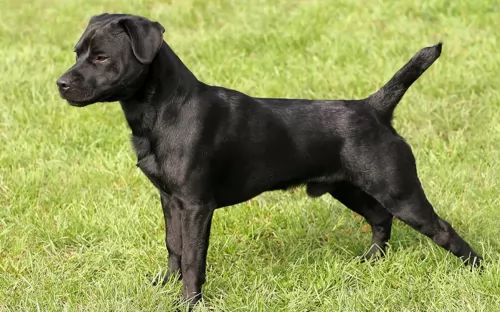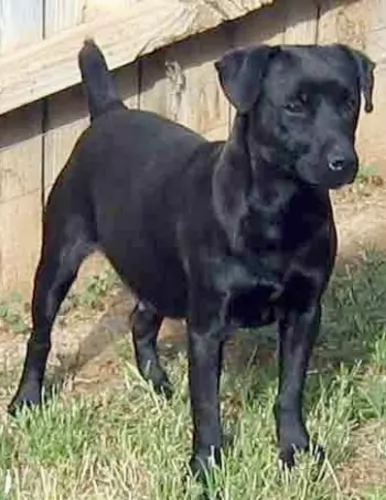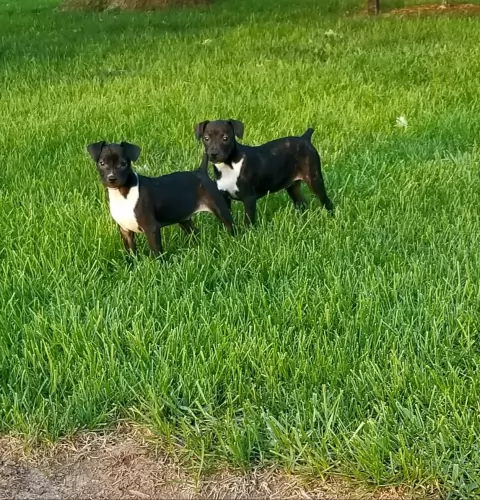 Petzlover
Petzlover Patterdale Terrier is originated from United Kingdom but Pudelpointer is originated from Germany. Patterdale Terrier may grow 28 cm / 11 inches shorter than Pudelpointer. Patterdale Terrier may weigh 23 kg / 50 pounds lesser than Pudelpointer. Both Patterdale Terrier and Pudelpointer has almost same life span. Patterdale Terrier may have less litter size than Pudelpointer. Both Patterdale Terrier and Pudelpointer requires Low Maintenance.
Patterdale Terrier is originated from United Kingdom but Pudelpointer is originated from Germany. Patterdale Terrier may grow 28 cm / 11 inches shorter than Pudelpointer. Patterdale Terrier may weigh 23 kg / 50 pounds lesser than Pudelpointer. Both Patterdale Terrier and Pudelpointer has almost same life span. Patterdale Terrier may have less litter size than Pudelpointer. Both Patterdale Terrier and Pudelpointer requires Low Maintenance.
 The Patterdale was developed in England,with his origins being linked to an early breeder with the name Joe Bowman.
The Patterdale was developed in England,with his origins being linked to an early breeder with the name Joe Bowman.
They were sought after for their prowess at guarding sheep from foxes. The dog was recognized by the United Kennel Club in 1995. It is believed the dog is descended from the Northern terrier breeds and can be traced far back.
 The Pudelpointer is cross between the Poodle and the English Pointer. The first Pudelpointer was bred in 1881 by Baron Von Zedlitz in Germany.
The Pudelpointer is cross between the Poodle and the English Pointer. The first Pudelpointer was bred in 1881 by Baron Von Zedlitz in Germany.
The idea was to bring about a gun dog highly skilled in tracking and retrieving. The Pudelpointer was introduced to North America in 1956, and in 1977 the Pudelpointer Club of North America was established.
Because breeders have avoided recognition by the American Kennel Club, the Pudelpointer never became a well known breed in the United States.
 The Patterdale Terrier is a small sized dog that stands at between 25 and 40 cm in height and weighs 5 to 7kg.
The Patterdale Terrier is a small sized dog that stands at between 25 and 40 cm in height and weighs 5 to 7kg.
The coat of the dog can be smooth, broken or rough, but all coats are double and weatherproof. Colors include red, liver, black, bronze, black and tan or chocolate and sometimes brindle. The ears are floppy and medium length and the tail is also medium length and held high, curving slightly. It used to be docked and then ¼ to 1/3 of the tail was removed.
The Patterdale Terrier is small but he is bold and confident and very energetic. He will certainly need to be in a household where the family members are active, busy people. Because he is strong-willed he will benefit from training and socialization which will make him obedient and able to behave well in different situations.
 The Pudelpointer stands at between 55 and 68cm in height and weighs between 20 and 30kg. He is a medium sized dog with a weather resistant, double-layered coat. The coat doesn’t shed much and is usually a brown, chestnut, liver or black color.
The Pudelpointer stands at between 55 and 68cm in height and weighs between 20 and 30kg. He is a medium sized dog with a weather resistant, double-layered coat. The coat doesn’t shed much and is usually a brown, chestnut, liver or black color.
The coat is usually dense, harsh and wiry. They have floppy ears with quite a unique feature - the mustache on the muzzle. The tail is docked, with about 30% being removed, giving the dog an attractive, distinctive look.
Full of energy, the lively Pudelpointer will love to find himself in a family where they are active, outdoorsy types. He loves water too, and when out on a hike, if there’s water around, he’ll be the first to jump right in.
He’s an intelligent dog too, eager to please and ready to learn. He can easily be trained and socialized. He is loyal, calm and loving and will get on well around children and other animals in the home. He is also protective and makes a good watchdog.
 Intelligent, courageous and feisty, the Patterdale Terrier is a dog that will get on well with everyone in the house. Those who are active and outdoor types will be the best kind of dog owners for this active, energetic dog.
Intelligent, courageous and feisty, the Patterdale Terrier is a dog that will get on well with everyone in the house. Those who are active and outdoor types will be the best kind of dog owners for this active, energetic dog.
The Patterdale is confident and strong willed and will do superbly well with some training and socialization. With lots of love and care, your Patterdale Terrier can make you an excellent family pet and companion.
 The Pudelpointer may well be a gun dog but when it comes to his human family he is a social, loving companion.
The Pudelpointer may well be a gun dog but when it comes to his human family he is a social, loving companion.
He is intelligent too and can be easily trained. When at home with his human family, he is calm and content. He will however need lots of exercise and mental stimulation. In exchange for your love and care, he will be a good watchdog, protector, pet and friend.
 The good news is that terriers have few health problems and they can live to a ripe age. Just like other dogs, they can also battle with some of the common dog ailments there are.
The good news is that terriers have few health problems and they can live to a ripe age. Just like other dogs, they can also battle with some of the common dog ailments there are.
Most allergens are foods, medicines or insects and exposure to the allergen can cause an over-reaction. In a dog, the most common symptom associated with allergies is itching of the skin. It can drive your pet mad as he licks and bites his skin. The symptoms of allergies can involve the respiratory system and he will have coughing and sneezing or even a discharge from the eyes.
Your Patterdales can also develop cataracts and glaucoma – two kinds of eye diseases. Glaucoma can unfortunately lead to blindness but something can be done if you recognize the signs. There are 2 main types of canine glaucoma, characterized by pressure inside the eye which can do damage to the retina and optic nerve – primary- and secondary glaucoma. Your vet will try to determine whether your pet has primary or secondary glaucoma to determine treatment.
 The Pudelpointer is active and healthy and can live up to 14 years and maybe even longer with good care.
The Pudelpointer is active and healthy and can live up to 14 years and maybe even longer with good care.
Owners will do well to know about a couple of the common dog illnesses that can strike at any time -
Some dogs are more at risk for bloating. Larger dogs with deep chests are at greater risk. To help with preventing this deadly ailment, feed your dog a couple of smaller meals a day instead of one big meal that he gobbles up quickly.
Bloat is a medical condition which comes about with a rapid accumulation of gas in the stomach. Canine bloat or gastric dilatation and volvulus is a killer disease. The accumulation of gas can cause the stomach to twist and the dog can go into shock.
Your dog will be trying to vomit, he’ll be panting and pacing, drooling with a hard, swollen stomach.
This is a common illness or condition seen in many dogs, young and old, large and small.It’s a disease which can lead to pain, arthritis and lameness.
The Pudelpointer has floppy ears and loves swimming. The floppy ears are at risk for developing ear infections. Check inside the ears that they aren’t red or have a discharge. Your dog will be scratching his ears a lot.
 Your Patterdale Terrier has a lot of energy, so as a responsible dog owner, you will need to see that he is exercised properly. This will include a walk every day as well as spending time throwing balls or a frisbee for him. He is a working breed and has been used to being mentally and physically stimulated.
Your Patterdale Terrier has a lot of energy, so as a responsible dog owner, you will need to see that he is exercised properly. This will include a walk every day as well as spending time throwing balls or a frisbee for him. He is a working breed and has been used to being mentally and physically stimulated.
The Patterdale Terrier isn’t a high maintenance dog and his coat will simply require a brush twice a week. Your pet can’t tell you about any pain he is experiencing so you will need to watch his body language.
Dogs can easily pick up an ear infection and this can be very painful. When you brush your pet, check inside his ears for signs of redness and discharge and check inside his mouth to see if you can spot any rotten teeth. Bad teeth can wreak havoc on his health. Keep the nails trimmed.
If you intend feeding your pet commercially manufactured food, good and well because it is a convenient way to feed your pet, but make sure its a quality food. This will ensure your dog is getting in the right amount of vitamins and minerals.
To vary his diet just a bit, provide him with some home-made food such as boiled chicken, brown rice or pasta, and some wholesome vegetables such as carrots, spinach and sweet potato. Dogs love the simplicity and nutritional value of food like this, and they don't have to worry about getting a stomach ache from strange foods. Try and include some raw meat into the kibble from time to time as well.
Never leave your Paatterdale Terrier without a constant supply of fresh cool water.
 Brush your PudelPointer twice a week to get rid of loose hairs.
Brush your PudelPointer twice a week to get rid of loose hairs.
Grooming can be an awesome bonding experience for you and your dog. While you’re brushing him, check him over for any unusual lumps.
Trim the nails if they don’t wear down naturally themselves.
Check inside the mouth for rotting teeth which can be a source of pain and lot of diseases in the body.
Exercise is very important and can come in the form of a walk every day or hikes, swimming as well as ball- and rope games and hide-and-seek.
Provide your dog with a nice warm, comfortable place to sleep.
Your PudelPointer can get to 14 years of age with good food. While you do get some excellent commercially manufactured dog foods, you want to be sure your pet gets some nutritious home-made food too.
Make sure that the kibble is the high quality ones with lots of vitamins and minerals. Boiled chicken, brown rice or pasta and spinach, sweet potatoes and carrots are a healthy choice for your pet – plain and simply just like dogs love it. Chop it up and add it into the dry kibble a couple of times a week.
Some raw meat added in from time to time will help his skin and coat remain healthy. Never leave him without a constant source of fresh, cool water.